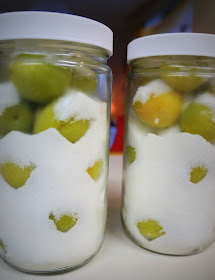This last installment is another no-alcohol mix and extremely easy - it's simply called "plum juice."
The instructions look like this:
1kg ume (green/unripe)
1kg regular sugar
Regular sugar is 砂糖 or satou
This is in contrast to the rock sugar used in previous recipes. Rock sugar adds the kanji for "ice" as a prefix.
氷砂糖 - koorizatou
As you can see on the instruction brochure, you put the plums into a plastic bag and then into the freezer for 24 hours. This serves a "scientific" purpose of course. The freezing will break down the internal cells and fibers of the flesh and make it easier to extract the ume juice along with the water.
The instructions say to wait 1 week and to mix it periodically. Mixing will prevent localized regions of dilution that form near the ume skin and optimize (you guessed it) the osmotic process. Remove the plums and save the juice in the refrigerator. Add some to soda water or ginger ale.
After about 3 days the water is coming out of the ume nicely and turned the sugar into syrup. The water that is in the ume wants to equalize concentrations on the inside and outside of the ume skin, with the skin being the semipermeable membrane. It takes one week for this process to complete. The ume will loose about 50% of their weight in water through this process and thus will shrivel up. Many dried fruit manufacturers use this process as an initial drying step since it is cheaper than other methods. Once this first 50% of the water is extracted they'll then use a vacuum drying process for the rest.
The sugar particles will also uptake to the fruit but at a much slower rate due to their larger molecular size. There is no use keeping the ume in the mixture for more than one week. Along with the water, the ume flavor also passes through the skin membrane and into the sugar. So you end up with an ume flavored syrup.
Here's an interesting research paper on using sugar to dehydrate fruits, which is essentially what we are doing here. And another good paper about osmotic dehydration.
Other ume related posts:
- How to make plum sour/no alcohol umeshu
- How to make umeshu 2012
- How to make umeshu 2013
- Plum wine buying guide
.JPG) |
| After 8 days, just before removing the ume |
One is that the skin was too thick and didn't allow osmosis to effectively occur and let the plum juice out. I don't buy that idea though. Water is a very small polar molecule and can pass through tiny openings.
The other is that there was a defect (which is possible due to the stem removal process) in which a hole existed allowing the sugar to come in as the water was going out. In a normal ume, the plum juice (water) will come out, but the sugar molecules are too big to effectively pass into the ume, this creates a vacuum if you will inside causing the ume to shrink.
However, if a defect exists, no vacuum will be created and pressures will remain equalized inside and outside the ume. Sugar molecules may easily pass to the inside. Therefore no shrinkage. That's the hypothesis at least.
.JPG) |
| A nicely shriveled ume |
.JPG) |
| Finished products |
This really turned out much better than expected and I deem it a complete success. Plums are still available so it may be time for round two.
This would make for a good science experiment if one would allow time to take some measurements before, during and after - measuring the weight of the ume and the sugar before and after. A plot over time would demonstrate the speed of the process. Different fruits could be used or different amounts of sugar could be used. Temperature could be another variable, but remember to vary only one thing.

.JPG)

.JPG)

How do you store this? Where should you store the syrup? And how long can this syrup be stored? Also should you add vinegar to avoid fermentation? If so how much vinegar. I am very confused regarding this part.
ReplyDeleteJust store it in the refrigerator. Probably good for up to 3 months but I'm not the expert on that. The vinegar trick might work, but that will change the flavor. There is another post on no-alcohol umeshu that does use vinegar. You can check that post for guidance. Sorry couldn't be of more help.
ReplyDeletehello. I'am from India and we don't get ume plums around here. However, I happen to have lots of regular sour plums and I'am very interested in trying this or the non alcohol umeshu. Do u think I could use the plums sucessfully?
ReplyDeleteI think it might work, but (most) of the Japanese versions use plums that are not ripe. So try to use what you have, but not ripe yet. There is no harm in using ripe ones if that is all you have - but they might not last a whole year sitting in the alcohol.
Delete